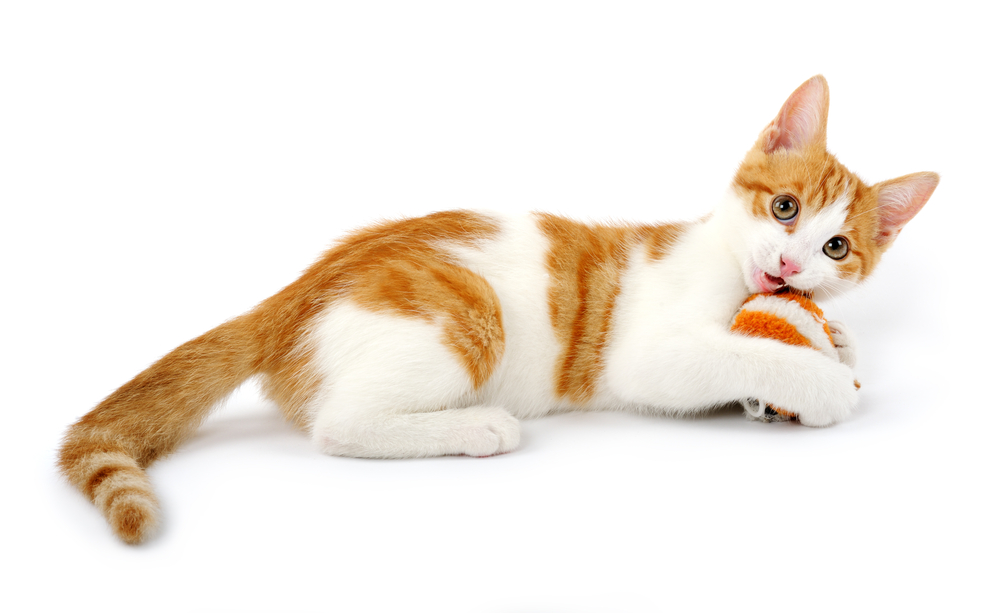Play is vitally important to a cat’s mental and physical health. Cats may sleep up to 16 hours a day, but when they’re awake, they need stimulation. Play is the best way to accomplish this.
Play is nothing more than a way for your domestic tiger to satisfy his natural hunting instinct. In the wild, when lions, tigers, and other wild cats aren’t sleeping, they’re either hunting or teaching their young to hunt. Jackson Galaxy defines play as “hunt, catch, kill, eat, groom, sleep.” A cat who can exercise all of these activities is a happy, well-adjusted cat. For both cats and humans, play has multiple benefits.
Weight Control
Obesity is the number-one health problem in cats. A 2017 survey by the Association for Pet Obesity Prevention shows that a staggering 60 percent of America’s cats are considered obese. Pet insurance company Nationwide reports that nearly 20 percent of its members’ claims in 2017 were for conditions and diseases related to pet obesity, marking a 24-percent increase over the last eight years. In addition to feeding a species-appropriate diet, exercise is the best way to keep your feline charges fit and trim.
Boredom Buster
Cats who aren’t challenged or entertained get bored, which can lead to depression and a slew of behavior problems. “At their core, cats are hunters,” says Marci Koski, Ph.D., a certified feline training and behavior specialist and owner of Feline Behavior Solutions. “Their instincts drive them to search for prey, investigating movements, sounds, and scents that might lead them to a mouse or bird in a complex environment that has nooks and crannies to explore. When cats are deprived of an outlet to express these natural instincts, they can become stressed or depressed. Behavioral issues often arise as a result, either as a way to find something to do, or to signal that something is very wrong in their world.”
Stress Relief
Cats are creatures of routine, and any change to that routine can result in stress. Changes in their environment such as a move, remodeling, or a new human or feline family member can create stress for cats. And since cats are sensitive to the energy around them, they can also pick up on their human’s stress. Regular playtime is one of the best ways to counteract stress in cats.
Play Therapy
Jackson Galaxy, host of Animal Planet’s “My Cat From Hell,” recommends “play therapy” in almost every case he tackles on the show. Play therapy is nothing more than a structured play session. Playing with your cat on a regular basis, ideally, at least twice a day for 10 to 15 minutes each, allows your cat to exercise her hunting instinct and provides a wonderful way to increase the bond between you and your cat. Make play therapy a regular part of your routine.
“Interactive play is a great tool for the cat-human relationship,” says Mikel Delgado, Ph.D., a post-doctoral fellow at the School of Veterinary Medicine at UC Davis and owner of Feline Minds, a cat behavior consulting business. “It provides a positive experience and exercise for the cat, which can have the added bonus of stress reduction. And for the human, you can really tune in to what your cat responds to as a fierce hunter!” Dr. Delgado stresses that “aside from the benefits you’ll experience from a tired and less stressed-out cat, for many cats, especially those who aren’t cuddly, play is an important way to bond with them.”
Creative Playtime
Toys that simulate prey and satisfy a cat’s innate hunting drive will be most effective for creating a fun play experience and burning off excess energy. Placing a cute catnip-filled toy in front of your cat and hoping that she’ll play with it doesn’t work with most cats. Interactive fishing pole-type toys are the best way to get your cat playing with you and to satisfy her hunting instinct. Move the toy erratically, at varying speeds, the way a cat’s prey would move in the wild.
Rotate toys. Put some toys away for a week or two, and then bring them out again. Your cats will think they got a brand-new toy.
Cat toys don’t need to be expensive. To a cat, almost everything can become a toy: paper grocery bags with the handles cut off, boxes, toilet paper rolls, milk carton tops, tissue paper – in a cat’s mind, these were all just made to be played with. Some cats enjoy chasing bubbles. Think like a cat, and you may be surprised at the things you already have in your home that make the purr-fect cat toy.
And as you’re playing with your cats, you may just find your own stress melting away.
This article was reviewed/edited by board-certified veterinary behaviorist Dr. Kenneth Martin and/or veterinary technician specialist in behavior Debbie Martin, LVT.
Ingrid King is the award-winning author of Buckley’s Story: Lessons from a Feline Master Teacher, Purrs of Wisdom: Conscious Living, Feline Style, and Adventures in Veterinary Medicine: What Working in Veterinary Hospitals Taught Me About Life, Love and Myself. She is a former veterinary hospital manager and certified veterinary journalist. Her popular website, The Conscious Cat, is a comprehensive resource for conscious living, health, and happiness for cats and their humans. Ingrid lives in Northern Virginia with her tortoiseshell cats Allegra and Ruby. For more information about Ingrid, please visit www.ConsciousCat.com.








